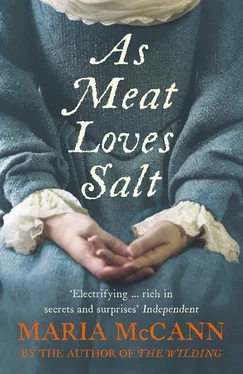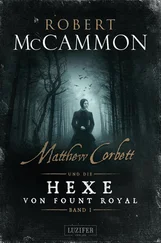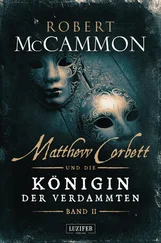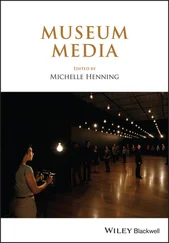‘He embraces her.’
‘Because he sees her unhappy! And should they kiss, what is it to you? You are not espoused, and if you like it not the remedy lies in your own hands.’
I was stunned, partly at this view of the matter, but mostly at what he had said of Zeb. ‘Zeb in love? Who?’
‘O, a certain maid whose ear he has been nibbling, full in your view, these past months. She has two eyes and a mouth and her name begins with P.’
Things that I had taken for jests came back to me: Zeb arm-wrestling Patience, or begging a lock of her hair ‘for lying on a maiden’s hair brings a man sweet sleep’.
‘Caro does not wish to break off, then—?’ I faltered.
Izzy rolled his eyes.
I went on, ‘Yet they spoke of cruelty – said it was cruel.’
‘You. You’re cruel to Caro.’
‘To Caro…?’ They had talked of a be . I was about to explain his mistake when the truth came to me. The cruelty Zeb had spoken of was my own, and the sufferer Izzy. My elder brother had never ceased to love Caro, that was it; he had but loved her more tenderly as she turned away from the shared kindnesses of their early years towards something different with me. O Izzy, Izzy: he was the better man of us two, I own it freely, but he was not the sort of man a maid dreams of taking to her bed, and he had been forced to learn it over and over as he watched me win her. I could hardly bear to look at him as he sat there, smiling in defeat.
‘Cruel to Caro, yes.’ I must now conceal my pity.
‘I would see her happy,’ he returned simply. ‘I thought her happiness must lie with you.’
He it was, I remembered now, who had first told me of her preference.
‘But I begin to think I was mistaken.’ Izzy stared ahead of him. ‘Lord, what brothers I have. One eats women and the other starves them.’ His voice trembled as he rose to leave the room.
‘Don’t go, Izzy.’ I flung my arms round him from behind. ‘Wait and see – I will declare myself.’ Even as I said it I felt what a bittersweet promise this must be to him.
He turned to me and we pressed our faces together, the way we had always made up our quarrels as children. I had to bend down now, having so far outgrown my childhood protector. His face was damp around the eyes and for a moment I felt with horror that he was about to cry, but his gaze was bright and steady.
As he put me away from him, Izzy said quietly, ‘You are near as handsome as he, and bigger.’
‘Don’t make me more of a fool than I am,’ I answered.
‘There, I knew you would not hear it.’
‘You love me too well, Izzy.’
He sighed. ‘Very well, think yourself ugly. But Jacob,’ he went on, ‘be not so harsh with Zeb.’
I said I would not.
Going to seek out Caro, I found Zeb and Patience in the scullery, his arms about her as she scraped at a dirty dish, and I wondered at my blindness for so long. My own darling I discovered moping in the great hall. When she saw me she rose, and would have quitted the room, but I stepped up to her and begged her forgiveness. Before we parted that night, our betrothal was a settled thing.
The Mistress furnished Caro with a good dowry. All the money I could afford for her portion had been put by out of my own sweat, and was not bad considering the little that servants such as ourselves could scratch together. Neither of us could fairly hope for more if we meant to stay where we were.
My brothers and myself had been born to better fortunes than we enjoyed, but our father, though godly, was strangely improvident. I found my inheritance wasted and my estate encumbered , was his constant cry throughout my childhood. Yet all shall be paid off, and you, Isaiah, shall inherit —
Dust and debt. There was nothing else for Izzy to come into. The day after we buried Father, I found Mother weeping in her chamber, the steward standing over her and papers scattered all around.
‘Jacob,’ she screamed at me as if it were my doing, ‘O my boy, my boy,’ and fell to tearing her lace collar. I took it for the grief, and wept along with her, until the steward came forward saying, ‘Pray, young master, send your brother Isaiah to us.’
When Izzy came out from the chamber he told me that we were nine-tenths ruined. The house and lands were certain to be seized. The steward was at that instant writing a letter for Mother to sign, begging our neighbour Sir John that of his goodness he succour a distressed widow of gentle birth and her three helpless children.
Sir John Roche was not in those days the wineskin he is since become, and his wife (who inclined to a somewhat Papistical style of worship) was known for her rather short-sighted charity. Our mother was given a cottage in the village and the three helpless children were put to work in the fields on Sir John’s estate. This was perhaps not what Mother had in mind.
Margett, who was at that time the cook at Beaurepair, later enlightened me. We were in the kitchen together and her forehead shone greasily as she bent over a pig she had on the spit. I thought her grey hair very ugly, but her face was kind, if wrinkled, and from her I could find out things the others kept secret.
‘Your father owed Sir John a deal of money,’ Margett said. ‘Turn the handle there, it’s about to catch. Lost a fortune by him, the Master did.’
And so he wished us to work his fields. It was every inch my mother, not to have understood this. She understood nothing but weeping, coaxing and prayer.
When we were let fall into the furrow, I was ill prepared for my new life. For one thing, I was then accustomed to the attentions of servants (though unlike Mervyn Roche, I had been taught always to address them with respect). Now I found a great abatement of rest and of comfort, whether I were in the field or cooped up in the dark cramped place that was become our home.
Most unendurable was the utter loss of all means of raising myself from the earth. My books were left behind in our old house. Weary as I was, I would gladly have had them by me. I could read well and was skilled in reckoning, knew my rhetoric and Scripture, and had begun the ancient tongues some years before.
‘A forward lad for his age,’ our tutor, Doctor Barton, had told my father. ‘He might be trained up in the law perhaps, and become secretary to some great man.’
Now the forward lad found himself grubbing at roots, spreading dung, pulling thistles. When there was nothing else to do a boy could always be set to scare crows. Alone in the field where none could see me at it, I wept. Zeb, too young to grasp that we would be wasted in this valley of humiliation, was less wretched, though from time to time he would whine, ‘When are we going home?’
The other workers were at first somewhat in awe of us, but when they understood that for all our polish we were penniless, things altered. Very soon they made no difference between us and themselves.
‘Here, young Cullen, take this off-a me; don’t stand there gawking,’ said a man who could not read. I felt myself bitterly degraded. When I perceived that I was forgetting what I had been taught, that my only study now would be scythes and manures, terror seized me.
Izzy, finding me one day in a fit of despair, knelt by me in the field and crooked his arm about my neck. ‘A man’s value lies in his obedience to God’s will,’ he said. ‘We are as precious to Him now as ever we were.’
‘He does not show it.’
‘Indeed He does. We eat and drink; we have good health, and one another,’ he reproached me. But I lacked his greatness of heart.
Margett also told me that about this time, My Lady passing by in the carriage was struck by the sight of the three ‘black-boys’ labouring in her field. She made enquiries, and found that while she had thought us to be living on the charity of the Roches, her husband had reduced us to peasants.
Читать дальше












